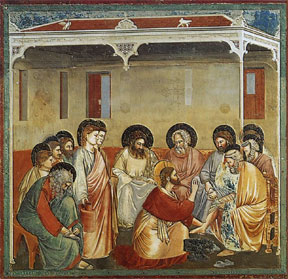Throughout the ages, commentators and preachers have seen Philippians 2:1-11 as a theological reflection on Jesus’ washing of the disciples’ feet in John 13. In this gospel text, Jesus literally humbled himself, doing that which an actual slave would ordinarily have done. He did this to teach his disciples how they were to love each other, in anticipation of his ultimate act of love on the cross. In Philippians 2, Paul uses the image of the humble, self-sacrificing, serving, crucified Christ to teach the Philippians believers how they ought to treat each other. (Photo: A fresco by Giotto, depicting the foot-washing in John 13.)
 Philippians 2 raises all sorts of tantalizing theological questions about the nature of Christ. In what way was he equal to God? In what sense did he empty himself? And so on. Yet Paul doesn’t deal with such questions in this text. Rather he uses the image of the humble Christ to show the Philippians – and by extension, to show us – how we ought to relate to each other. We’re called to imitate Christ, not in any way we please, but specifically with respect to his humbling, self-giving, sacrificial action.
Philippians 2 raises all sorts of tantalizing theological questions about the nature of Christ. In what way was he equal to God? In what sense did he empty himself? And so on. Yet Paul doesn’t deal with such questions in this text. Rather he uses the image of the humble Christ to show the Philippians – and by extension, to show us – how we ought to relate to each other. We’re called to imitate Christ, not in any way we please, but specifically with respect to his humbling, self-giving, sacrificial action.
This isn’t easy to do! It’s hard to do what this text requires in the best of times. Even when I’m getting along well with others I still find it natural to put my self-interest first. But, when you’re in the midst of conflict with other believers, doing what Philippians 2 requires is more than hard. It’s impossible . . . without God, that is. It challenges the very fiber of our being. It calls us to counter-intuitive and counter-cultural humility. And we’re just not wired to do this sort of thing apart from divine help.
But God’s help is available to us in several ways. These are highlighted in verse 1 of our text, which I’d paraphrase in the following way: “If there is any encouragement in Christ – which, of course, there is – any empowering comfort in Christ’s love – which, of course, there is – any partnership with the Holy Spirit – which, of course, there is – [agree together, love each other, etc.].” Here’s what God provides to help us do the impossible:
1. Encouragement in Christ – The teaching and example of Jesus himself empower us to do what otherwise we could not do.
2. Empowering Comfort in Christ’s love – The more we experience Christ’s love for us, the more we will be enabled to love with this same sort of love. The more we are secure in Christ’s love, the more we will be able to take the risk of loving, not only our neighbors, but also our enemies.
3. Partnership with the Holy Spirit – When we put our faith in Christ, the very Spirit of God comes to dwell in us, empowering us with the same power that raised Jesus from the dead. The Spirit is in the process of making us more and more like Christ.
Years ago, I was the pastor in charge of a group of leaders. This group was in the midst of a nasty conflict. One of the leaders was especially vicious in the way she was treating another leader. I challenged her to think about what Jesus would do. Her response, shouted passionately, was: “I don’t care what Jesus would do! I’m not Jesus!” I was tempted to say, “Well, that’s fairly obvious,” but, by God’s grace, I didn’t. Instead I reminded her of the good news that God, through the Spirit, helps us to be like Christ even when our natural capabilities are inadequate. The confession “I’m not Jesus!” is actually a great place for every Christian to start, including me! But it’s not a place to end. Once we realize our own inadequacies, we’re ready to trust God more completely, and to discover that we can do all things through Christ who makes us strong (Philippians 4:13).
So, when you’re in the middle of conflict, ask yourself: “What would it be for me to have the mind of Christ here?” And don’t just ask yourself, ask Christ himself through prayer: “Lord, how would you think in this circumstance? How can I imitate your example of selflessness and humility now?” The more you look to Jesus, the more you’ll discover how you’re to act in controversial and divisive circumstances. The more you depend upon Jesus, the more you’ll find unexpected strength to be agreeable, loving, humble, other-directed, and Christ-like.

